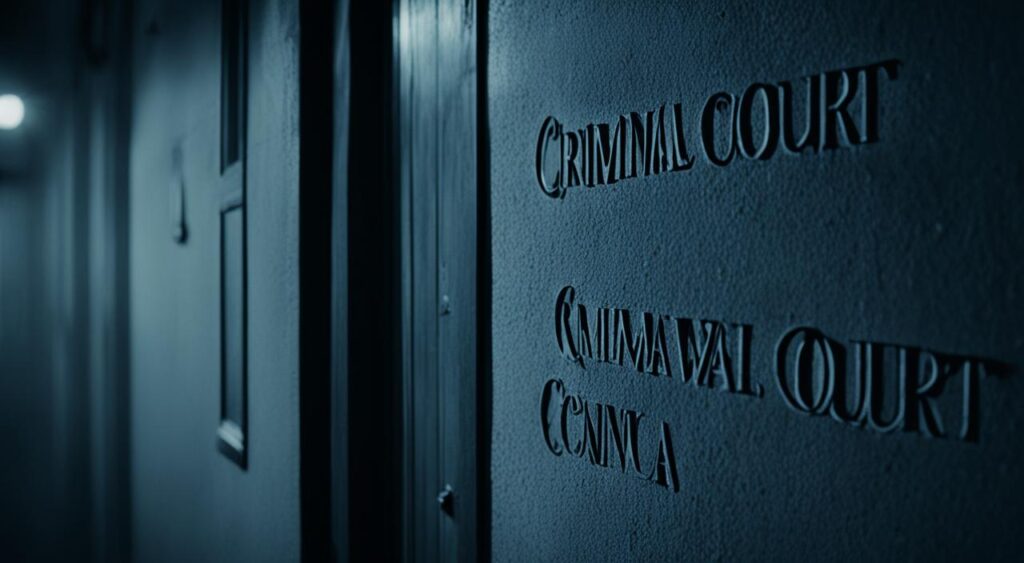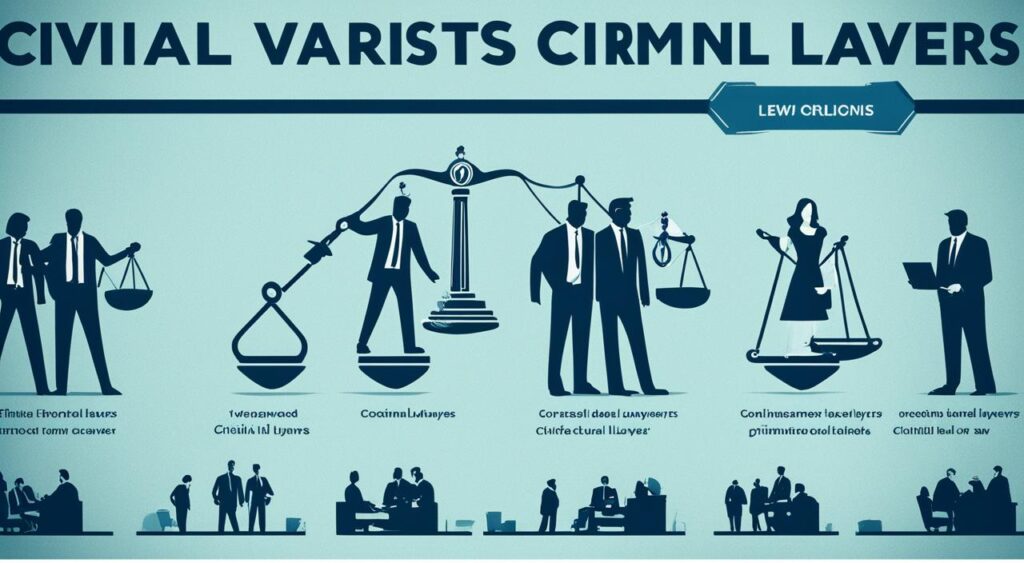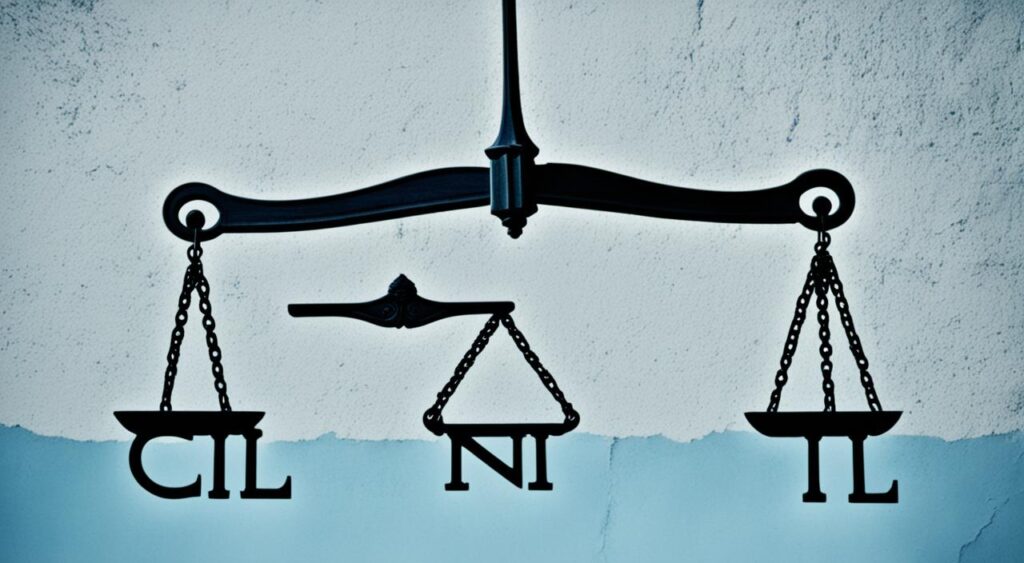In the legal world, civil and criminal lawyers have very different jobs but both are important. Civil lawyers work on issues between people or companies, focusing on laws like contracts, property, and family law. Conversely, criminal lawyers help defend those accused of crimes, as the government prosecutes these cases. The key difference is the type of legal system they are involved in and who their clients are.
Civil lawyers help clients who have suffered an injury or have a legal dispute with others. They do this by representing them in court and negotiating settlements. Criminal lawyers, on the other hand, help those facing criminal accusations. They may deal with cases from minor offenses to serious crimes, like theft or even murder.
Another big difference is the goal of the law in civil and criminal cases. Civil law seeks to settle disagreements and compensate those whose rights were violated. In contrast, criminal law focuses on protecting society. It does this by either punishing or working to change those who have broken the law.
Key Takeaways
- Civil lawyers handle disputes between individuals or private organizations, while criminal lawyers defend clients accused of committing crimes.
- Civil lawyers practice civil law, which deals with disputes between private parties, while criminal lawyers practice criminal law, which deals with crimes against the state.
- The main difference between civil lawyers and criminal lawyers is the type of law they practice and the parties they represent.
- The legal process and the purpose of the law differ significantly between civil and criminal cases.
- Civil lawyers typically represent clients who have been injured or have a disagreement with another person or organization, while criminal lawyers represent clients accused of committing a crime.
Understanding the Scope of Civil Law
Civil law deals with many legal matters, each with its own rules. It includes contract, property, family, and tort law. These aspects are essential for solving arguments between people and groups.
Contract Law
Contract law focuses on legal agreements between individuals or groups. These deals can be about money, services, goods, or property. Experts in contract law make sure these agreements are legally binding and protect everyone’s rights.
Property Law
Property law looks at different ownership and use rights for personal and real estate property. It involves things like who owns what, lease rules, and property arguments. Real estate lawyers help with buying, selling, and managing properties.
Family Law
Family law deals with legal matters around family ties, like marriage or child custody. Lawyers in this field help sort out personal and money issues. They help decide on things like sharing property and who gets custody of children.
Tort Law
Tort law helps people get paid if they are harmed due to someone else’s carelessness. It covers things like accidents and medical mistakes. Lawyers working in personal injury law aim to get the injured party compensated for their loss.
Civil lawyers are key in guiding people through the complicated world of civil law. They give the legal advice and support needed to solve legal fights.
The Role of a Civil Lawyer

Civil lawyers are essential for guiding people through the legal system and defending their rights. They handle many tasks, such as going to court for their clients, working out deals, and giving detailed legal advice.
Representing Clients in Court
In court, civil lawyers express their client’s side clearly and briefly. They question witnesses, present evidence, and make strong legal points. Their goal is to achieve the best results for their clients. This includes individuals and companies in legal battles.
Negotiating Settlements
Besides court, civil lawyers are key in settling cases outside a trial. They work to find common ground and encourage discussions. This approach can help both sides avoid the costs and risks of a trial, thanks to the lawyers’ negotiation and legal expertise.
Providing Legal Guidance
During the legal journey, civil lawyers offer critical advice to their clients. They explain their rights, options, and the possible outcomes of their decisions. This guidance allows clients to make choices that serve their best interests and deal with legal issues smartly.
What is Criminal Law?

Criminal law is a type of law that deals with crimes. These crimes harm the state or nation. It includes rules to punish or change the behavior of people who break the law. This law is different from civil law, which focuses on conflicts between people or groups.
Misdemeanors
Misdemeanors are less serious crimes like parking tickets or being drunk in public. People also include minor drug offenses in this category. They usually face fines, loss of certain rights, or very short jail times, less than a year. These crimes are not as serious as felonies.
Felonies
Felonies are the most serious crimes. They include things like murder and serious assaults, as well as drug dealing. People found guilty of felonies can be jailed for a long time. In some places, they might even face the death penalty. Felonies cause major harm to society or individuals and are seen as very serious.
Key Differences Between Civil and Criminal Law

Civil law and criminal law differ in who’s involved and their aims. In criminal cases, the state accuses the defendant of wronging society. Civil cases involve private folks or groups. They aim to resolve conflicts or compensate for harm.
Burden of Proof
In criminal law, prosecutors must show the defendant’s guilt “beyond a reasonable doubt.” Conversely, civil law deals with a lower standard. Plaintiffs just need to prove their case is more likely true than not, over 50%.
Purpose of Law
Criminal law seeks to protect society by holding wrongdoers accountable. In contrast, civil law aims to make individuals or groups whole after their rights are violated. It’s about resolving private disputes and compensating for the harm done.
Parties Involved
The state takes action in criminal cases, acting as the prosecutor against the accused. In civil cases, it’s private parties or groups. The plaintiff brings a claim against the defendant seeking resolution or compensation.
When Civil and Criminal Law Intersect

While civil law and criminal law handle different types of offenses, they can sometimes mix or overlap. If a situation leads to a criminal prosecution and a civil lawsuit together, this is a key example. For instance, a victim might sue a wrongdoer for civil damages also connected to a crime. Sometimes, civil cases touch on prison time or other criminal sentences, challenging them based on constitutional rights. This blurs the clear lines between these legal areas.
In such cases, the outcomes of criminal and civil cases can differ greatly. Someone could be cleared of charges in criminal court but still found responsible in a civil case. This situation showcases the intricate and ever-changing legal system. It uses different laws and rules to tackle the complex problems in our society.
Civil Lawyers: Salary and Job Prospects

Civil lawyers can make a good living, with an average salary of $133,437 in the U.S. But, this amount can change a lot. It depends on where they work, the cost of living, and what area of law they focus on.
Average Salary Range
The average salary for a civil litigation lawyer is about $133,437. But things like experience, reputation, and the case’s complexity can make this number go up or down. Some new civil lawyers might earn between $80,000 and $100,000. Experienced civil lawyers, though, might make over $150,000.
High-paying Civil Law Specialties
Some areas of civil law pay better than others. The top-paying specializations include:
- Personal Injury Lawyers: With experience, personal injury lawyers can make over $200,000 a year. They get a big payment for winning cases.
- Medical Lawyers: Those working on medical malpractice or health law can also earn a lot. Some make more than $160,000 yearly.
- Intellectual Property Lawyers: Lawyers who work with patents, trademarks, and copyrights have high-earning potential. The top earners in IP law make six figures.
In general, civil lawyers have a wider salary range than criminal lawyers. Criminal lawyers in the U.S. make around $78,500 on average. How much a civil lawyer makes can vary based on their area of law, expertise level, and where they work.
Criminal Lawyers: Salary and Job Prospects
Criminal lawyers in the U.S. make about $78,500 each year on average. This amount can vary greatly. It goes from $45,000 to $130,000 or even more. The difference depends on where they work and what they do. For example, a move to becoming a district attorney can offer between $89,310 to over $100,000.
Average Salary Range
The average earnings for criminal lawyers in the U.S. hit around $78,500 yearly. But pay can swing widely. In places where living costs are high, or with complex cases, they can earn more. Yet, in areas with lower living costs, or for those just starting out, pay might be lower.
Prosecutor and Public Defender Roles
Inside the criminal justice world, we find not only defense lawyers but prosecutors and public defenders too. Prosecutors, working for the government, can make from $89,310 to over $100,000. This amount depends on their experience and where they work. Meanwhile, public defenders help people who can’t pay for a lawyer. They typically earn between $45,000 and $80,000. But, just like prosecutors, their earnings can vary based on their location and the work they do.
Civil Lawyers: Practice Areas and Expertise
Civil lawyers focus on various legal topics to help clients with civil cases. They work in areas like personal injury, contracts, and business law. Real estate is also one area where their skills are needed.
Personal Injury Lawyers
These lawyers help people hurt in accidents get compensation. They fight for clients in cases from car wrecks to mistakes by doctors. Their work is about making sure injured people’s rights are protected.
Contract Lawyers
Contract lawyers are key in making sure agreements are fair and clear. They help with all sorts of deals, making sure everyone knows what they’re signing up for. Their job is vital to preventing misunderstandings and legal trouble later on.
Real Estate Lawyers
Real estate lawyers tackle issues around buying, selling, and renting property. They help with things like checking titles, sorting out zoning laws, and solving property arguments. Their work makes real estate deals smoother and legally sound.
Business Lawyers
Business lawyers support companies and entrepreneurs in various legal matters. They help with starting businesses, making deals, and solving disagreements. Their deep knowledge in corporate, intellectual property, and employment laws is important for business success.
Also Read: Informed Decision-Making: Tips For Hiring A Lawyer
Criminal Lawyers: Practice Areas and Expertise
Criminal lawyers focus on different legal areas. They are experts in defending, prosecuting, or handling white-collar crimes.
Defense Attorneys
Criminal defense lawyers defend people accused of crimes big or small. They ensure their clients’ rights are protected during the legal process. Their job involves creating a strong defense, disputing evidence, and aiming for positive outcomes. These could be as serious as a dismissal of charges or as good as a sentence reduction.
Prosecutors
Prosecutors bring forth charges against accused individuals. They present the government’s side in court to find the truth. Working with law enforcement, they gather evidence and make sure criminals face justice. This keeps the system fair and society safe.
White-Collar Crime Lawyers
White-collar crime attorneys specialize in financial offenses like fraud or money crimes. Such cases need a good handle on financial records and complex legal details. They must know financial laws well to help their clients, which could be individuals or companies.
These legal professionals provide essential services. They ensure fairness and protect everyone’s legal rights. Their work is vital in our justice system.
Conclusion
Civil and criminal lawyers are vital in our legal system. Civil lawyers manage conflicts between people or groups. They work in areas such as contracts, property, and family law. Their job includes going to court and negotiating deals for their clients. On the other hand, criminal lawyers help people accused of crimes. They face off against the government’s legal team.
Both kinds of lawyers work to make sure justice is served. Even so, civil and criminal cases are very different. The choice between being a civil or criminal lawyer comes down to what you like, what you’re good at, and where you want to focus. Either way, they both play big roles in making sure our legal system works well.
Whether you need help with a civil issue or criminal charges, knowing the difference in legal services is key. This knowledge can help you decide the best legal path for your needs and goals. It’s about making an informed choice for your future.
FAQs
Q: What is the difference between civil lawyers and criminal lawyers?
A: Civil lawyers specialize in civil litigation cases that involve disputes between individuals, organizations, or entities. On the other hand, criminal lawyers focus on cases where criminal charges are brought against a person by the government.
Q: How can a civil litigation attorney help with my case?
A: A civil litigation attorney can provide legal representation in civil matters such as breach of contract, business litigation, personal injury cases, and more. They can help you navigate the legal process and advocate for your interests in civil court.
Q: What types of civil litigation cases do lawyers handle?
A: Civil lawyers handle a wide range of cases including contract disputes, property disputes, employment law matters, intellectual property disputes, personal injury claims, and more.
Q: How do I find experienced civil litigation attorneys?
A: You can search for top rated civil litigation lawyers in law firms specializing in civil litigation. Many firms offer free consultations where you can discuss your case and assess the expertise of the attorneys.
Q: What is the civil litigation process like?
A: The civil litigation process typically involves filing a complaint, pre-trial discovery, negotiation or settlement discussions, trial proceedings, and potentially an appeal if the case is not resolved at trial.
Q: Can civil suit lawyers represent clients in criminal cases?
A: No, civil suit lawyers focus on civil litigation matters and are not authorized to represent clients in criminal cases. Criminal lawyers specialize in criminal law and defense.
Q: How do I schedule a free consultation with a civil litigation attorney?
A: You can contact a law firm specializing in civil litigation and request a free consultation to discuss your case. Many firms offer this initial meeting to assess your legal needs and provide guidance on the next steps.




